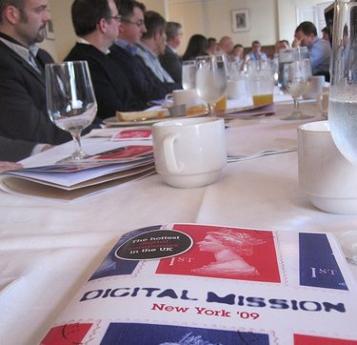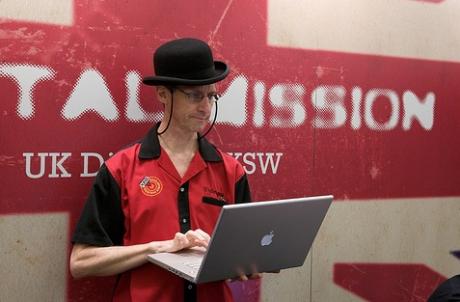 A short pause for breath in the Digital Mission activities provides an opportunity to blog about the investor breakfast yesterday morning. It was organised in conjunction with The Hatchery and UKTI at the very digital Roger Smith Hotel - more on that in a moment.
A short pause for breath in the Digital Mission activities provides an opportunity to blog about the investor breakfast yesterday morning. It was organised in conjunction with The Hatchery and UKTI at the very digital Roger Smith Hotel - more on that in a moment.
The companies and investors mingled over breakfast, then both groups gave a short introduction before we dived into a roundtable Q & A session. I was struck by how frank the investors were. I've been dealing with VCs for more than a decade, and it was one of the most open exchanges I've seen, and with a broad range of investor types too. There were lots of sound bites and snippets, I'll share a few...
 Web 2.0 Expo is in full flow. Yesterday the Digital Mission companies had the opportunity to check out the talks and keynotes.
Web 2.0 Expo is in full flow. Yesterday the Digital Mission companies had the opportunity to check out the talks and keynotes.
It was an interesting tone, as Mr Web 2.0 himself, Tim O'Reilly took to the stage to give a speech that was both a 'state of the web' address and a challenge to Google: Would they persue an open web or would they take the path of "one ring to rule them all," producing increasingly closed systems.
 For
the debt-riddled graduates flooding the jobs market, an internship is an essential bridge to full-time work and enthusiastic young, relatively cheap, talent has its own rewards for employers. But stay on the right side of the law.
For
the debt-riddled graduates flooding the jobs market, an internship is an essential bridge to full-time work and enthusiastic young, relatively cheap, talent has its own rewards for employers. But stay on the right side of the law.
Employment law can be a tricky business and the fallacy that an internship equals free labour could potentially land a company in hot water.
There are a few basic legal rules worth bearing in mind should you wish to offer an internship.
Danvers Baillieu, technology lawyer at Winston & Strawn LLP and Bootlaw founder addressed this very issue at a Bootlaw meetup evening earlier this year:
"The shades of grey apply particularly in relation to the requirements of the National Minimum Wage Act 1998 (NMWA 1998)"
Under the National Minimum Wage Act (NMWA 1998), anyone who is a worker, that is a person who is employed by you and no one else, must be paid, the minimum wage and according to the act a worker is defined as:
“an individual who has entered into or works under (or,
where the employment has ceased, worked under)" is an employee and must
be paid accordingly.
Exemption from the rule are builders, accountants or other types of contractors. The minimum wage for over 22 year olds is £5.73/hour (£229.20/week based on 40hrs) and £4.77/hour (£190.80/wk) for 18-22 year olds.
 The Digital Mission companies have arrived in New York and are well into the first day's activities, which kicked off with the Master Class session at Winston & Strawn's offices.
The Digital Mission companies have arrived in New York and are well into the first day's activities, which kicked off with the Master Class session at Winston & Strawn's offices.
It's amazing to think that a year has passed since the previous Digital Mission to New York, but the view across New York from the Met Life Building brought the memories back. New York is a unique city, with a very distinctive vibe and culture. Doing business here is both challenging and exhilarating.
The panels were a pleasant mix of new and familiar faces, kicking off with the basics of setting up in the US, including dealing with general legal issues, employment law, Intellectual property and tax. You might be a UK business, but US courts can claim jurisdiction over you. The US legal systems operates at a state level, which raises the spectre of 50 different courts reaching their long-arms out to you.
 A revision of EU privacy law could have a devastating effect on online advertising.
A revision of EU privacy law could have a devastating effect on online advertising.
Under the new rules publishers must gain users' consent before placing cookies on their machines. Online ad practises like behavioural targeting, retargeting and audience segmentation will all be effected.
The change will see national governments having to:
"ensure that the storing of information, or
the gaining of access to information already stored, in the terminal
equipment of a subscriber or user is only allowed on condition that the
subscriber or user concerned has given his/her consent, having been
provided with clear and comprehensive information."
The EU are objecting to online advertisers collecting data without the users' knowledge. Common practice is to make users aware of cookie use through privacy policies posted in their small print. With ever-improving behavioural and semantic targeting relying on cookies, the EU's threats to step in if the industry doesn't regulate itself will raise concerns at publishers in an already-difficult advertising market. The gloves, it appears, are most definitely off.
 If the latest figures from Forum One Networks' Online Community & Social Media Compensation Survey are to be believed, it's not good news ladies.
If the latest figures from Forum One Networks' Online Community & Social Media Compensation Survey are to be believed, it's not good news ladies.
The company's 2009 survey found that the gender pay gap is widening in social media at least. Male respondents to the survey made just over $86,644 (£52,249) while female respondents, in comparison, averaged just $75,624 (£45,702) a difference of almost $9,000. According to the survey women make 87% of what a man in a similar role brings home every month.
This time last year Forum One's 2008 study found that 55% of community managers were women. In 2009 this figure fell to 52%. Even with a slight dip in the number of women in social media's top jobs they still out number men in the sector; something which makes the pay difference strange.
 The benefits of having an intern are numerous. It’s
not just cheap labour and someone to make the tea.
The benefits of having an intern are numerous. It’s
not just cheap labour and someone to make the tea.
Many organisations
are reaping the rewards that come with an internship and a skilled graduate.
It was a case of
unknown territory when Chinwag took on Gregory, our first tech intern. It took time
and effort to get him started, but the investment paid off and the work he did was invaluable.
So, in the sprit of this, we’ve created a
series of blog posts, from an employer's perspective, that aim to cover everything you need to know about offering an internship.



 Web 2.0 Expo
Web 2.0 Expo






